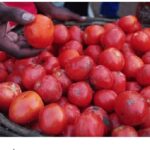Tomatoes Substitution; Nigerians turn to cucumber, cayenne pepper as tomato prices bite
Tomatoes Substitution; Nigerians turn to cucumber, cayenne pepper as tomato prices bite

Tomatoes
As the cost of tomatoes continues to soar, Nigerians are increasingly turning to alternatives like cucumbers, carrots, and cayenne peppers for their cooking needs. These substitutes are helping to mitigate the financial impact of the rising tomato prices, which have skyrocketed in recent months.
Research by BusinessDay reveals that many Nigerians are now incorporating cucumbers, carrots, and cayenne peppers, also known locally as ‘shombo,’ into their stews and other dishes. The price of fresh tomatoes has surged by over 120% within the last couple of months, prompting consumers to opt for more affordable options like tomato paste.
A recent market survey highlighted that the price of a big basket of fresh tomatoes at Lagos’s Mile 12 market has risen to around N110,000, compared to the N40,000-N50,000 range just a few months ago. This sharp increase has forced many to find alternatives. Folake Aturamu, a Lagos resident and mother of four, has started using ‘shombo’ pepper and tomato paste in place of fresh tomatoes to achieve the desired thickness in her stews.
Similarly, another mother of five has switched to ‘tatashe’ pepper due to the prohibitive cost of tomatoes, lamenting the steep prices that have made it difficult to purchase even a few fresh tomatoes. Oluchi Duru, a mother of two, shared that she now uses cucumbers in her stew, finding it a satisfactory replacement.
An Aba-based businesswoman reported that she now uses carrots mixed with cayenne and red bell peppers as an alternative in her cooking. This combination, she says, yields a stew that rivals the traditional tomato-based version.
Social media is also abuzz with Nigerians sharing their newfound reliance on cucumbers. Sapphire Odufuwa, on X (formerly Twitter), described how her family has embraced cucumber-based sauces as a staple, blending it with onions, ‘tatashe,’ and other peppers for a flavorful dish.
Experts attribute the dramatic rise in tomato prices to seasonal factors, as tomatoes do not thrive in the rainy season. Additionally, high transportation costs and middlemen’s fees contribute to the inflated market prices. Sani Danladi, national chairman of the Association of Tomato Growers, Processors, and Marketers Association of Nigeria, anticipates that prices will decrease with the onset of the dry season when tomato cultivation improves.
TRENDING SONGS
 Ahmad Yerima: Naval Officer to Face No Sanctions After Clash with Wike – Matawalle
Ahmad Yerima: Naval Officer to Face No Sanctions After Clash with Wike – Matawalle
 Trending Video: Muslim Man Joins Wife in Hallelujah Challenge ‘Dress Like Your Miracle’ Night
Trending Video: Muslim Man Joins Wife in Hallelujah Challenge ‘Dress Like Your Miracle’ Night
 Woman Seeks Advice as Late Brother’s Wife Refuses to Mourn Him Following His Death With Alleged Mistress
Woman Seeks Advice as Late Brother’s Wife Refuses to Mourn Him Following His Death With Alleged Mistress
 Nobody Cares About Fine Girls In The UK, I Miss Nigeria — Nigerian Lady Laments
Nobody Cares About Fine Girls In The UK, I Miss Nigeria — Nigerian Lady Laments
 Wedding Called Off: How Lady Cancels Wedding After Finding Out Finance’s Affairs With Her Bestie
Wedding Called Off: How Lady Cancels Wedding After Finding Out Finance’s Affairs With Her Bestie
 Heartbreak in Ikeja: Lady Weeps After Fufu Found in New Phone Package
Heartbreak in Ikeja: Lady Weeps After Fufu Found in New Phone Package
 Twist of Fate: Man Who Questioned Phyna’s ₦1Billion Demand Mourns Brother in Dangote Truck Crash
Twist of Fate: Man Who Questioned Phyna’s ₦1Billion Demand Mourns Brother in Dangote Truck Crash
 Tragedy in Enugu: Dangote Truck Claims Lives of Family of Five
Tragedy in Enugu: Dangote Truck Claims Lives of Family of Five
 Bangkok Crackdown: Nigerian-Thai Couple in Police Net Over Drug Trafficking
Bangkok Crackdown: Nigerian-Thai Couple in Police Net Over Drug Trafficking
 Family Rift: Reno Omokri’s Ex-Wife Says He Deserted Their Special Needs Son
Family Rift: Reno Omokri’s Ex-Wife Says He Deserted Their Special Needs Son
Share this post with your friends on ![]()













